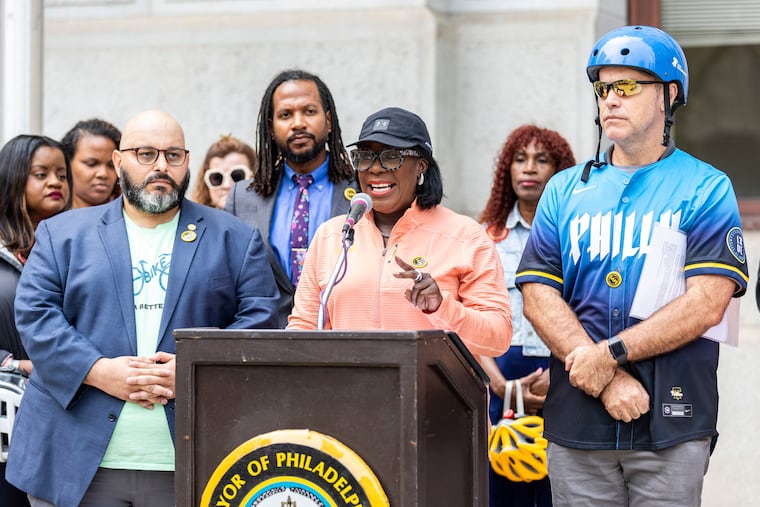Mayor Parker tells cycling activists the city has plans to make bike lanes safer
The Office of Transportation and Infrastructure Systems has developed plans with several options for protecting bike lanes from vehicles.

Mayor Cherelle L. Parker hopped on an Indego bike and pedaled west on JFK Boulevard on a symbolic ride of unity Friday with dozens of cycling activists who have criticized her administration for not doing enough to protect bike lanes from motor vehicle traffic.
“I may not be a good bike rider, but I didn’t fall,” Parker joked afterward. Beforehand, she had asked her companions to “go slow” and show her “grace” as she tried something she hasn’t done much.
Parker and officials from her administration met with the activists outside City Hall to update them on plans to address their demands for concrete barriers to shield riders from traffic along the bike lanes on Spruce and Pine Streets and Allegheny Avenue — and other safety changes.
The mayor also wanted to make it clear that she is committed to traffic safety and is pushing forward with traffic-calming projects across the city, to make the streets safer for pedestrians, cyclists and drivers.
“When we talk about ensuring that we eliminate serious injury crashes, we’re not just talking about Center City,” Parker said. “This is essential for every neighborhood — no matter your race, your class, your socio-economic status, zip code, religion, sexual orientation [or] identity.”
Parker asked to be held accountable. “Don’t listen to what I say. Listen to what I do,” she said.
The event was suggested by the Bicycle Coalition of Greater Philadelphia and city Managing Director Adam Thiel to clear the air after some mixed signals and frustration from the activists that they weren’t being heard, and from the city that its work on safety was not getting through to the public.
“This is a big moment for us, the beginning of a beautiful partnership,” said Chris Gale, executive director of the Bicycle Coalition.
Cycling organizations and representatives of other traffic-safety advocacy groups brought a petition for those changes, with 6,000 signatures and 4,000 written comments, into a nearly deserted City Hall on the afternoon of Aug. 15. They said they received no response.
At other times, the activists have said that the mayor has made comments that they consider lukewarm to bike lanes.
The bicycle coalition, along with Families for Safe Streets, 5th Square, and Philly Bike Action had been collecting the signatures — as well as about 4,000 written messages — since July 17, when Barbara A. Friedes, 30, a physician who was a pediatric oncology resident, was struck and killed while riding in the Spruce Street bike lane by a driver police said had a blood-alcohol concentration of 0.16%, twice the legal limit.
The Spruce Street bike lane, as well as its twin along Pine Street, have only flexible plastic lane dividers, which the driver blasted through before hitting Friedes. Experts say the safest bike lanes are protected by concrete barriers.
Those can be planters, bollards, raised concrete “pills” that discourage people from driving over them and into a bike lane, based on what’s been done in other cities.
Decisions on which options to pursue will be made after extensive public engagement, Parker and Thiel said. They did not disclose specifics of what options are being considered.
“It is important that the voices of the people who actually live and are directly impacted where we want to make these adjustments have their voices heard,” Parker said.
At that comment several people in the rear of the crowd booed and objected. “I just want to say, give your mayor a chance,” Parker said.
To Michael McGettigan, a longtime cycling activist and owner of Trophy Bikes, talk of engagement has usually meant that proposed safety changes are effectively vetoed.
“No more studies. Let’s have some concrete,” McGettigan, 70, told the mayor, pointing to the sidewalk. “You know what to do. Let us do it. Let’s stop asking motorists if their ‘feelings’ are hurt.”
Parker said “I hear you” and said his perspective will be seriously considered.
For the record, Parker rode the whole route from 15th and JFK to 19th Street, then along Market Street back to City Hall — in the parking-protected bike lane.
Inquirer staff writer Sean Collins Walsh contributed to this article.